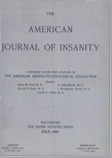NEUROPSYCHIATRIC ASPECTS OF LIPODYSTROPHIC DISTURBANCES
Abstract
Eighty-two reports of cases of lipodystrophy were reviewed. Fifteen patients were markedly self-conscious about changes in their appearance. In 17 cases the family or friends were worried about the patient's health. In eight, nervous or mental symptoms were rather marked. In 43 no abnormality of behavior was noted.
There seemed to be no psychiatric symptom-complex common to lipodystrophy, aside from self-consciousness and the tendency to share in the alarm of friends and relatives. Psychiatric symptoms when present seemed on the whole to be psychoneurotic. No constant neurologic symptoms or signs were observed accompanying lipodystrophy.
Although weakness is a usual symptom at one stage or another of lipodystrophy, no general symptom-complex or diseases can be considered closely related to it until more cases are available for study.
Nervous symptoms in all cases resulting from self-consciousness over personal appearance are not constantly present. No conclusive evidence has been collected to support the theory that the integrity of the nervous system is affected by the disorder.
Access content
To read the fulltext, please use one of the options below to sign in or purchase access.- Personal login
- Institutional Login
- Sign in via OpenAthens
- Register for access
-
Please login/register if you wish to pair your device and check access availability.
Not a subscriber?
PsychiatryOnline subscription options offer access to the DSM-5 library, books, journals, CME, and patient resources. This all-in-one virtual library provides psychiatrists and mental health professionals with key resources for diagnosis, treatment, research, and professional development.
Need more help? PsychiatryOnline Customer Service may be reached by emailing [email protected] or by calling 800-368-5777 (in the U.S.) or 703-907-7322 (outside the U.S.).



